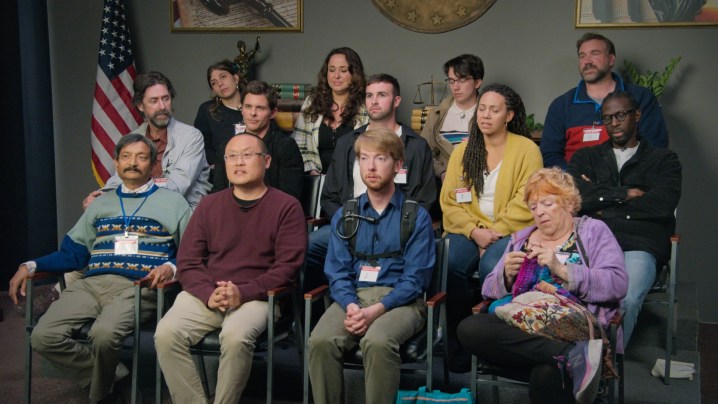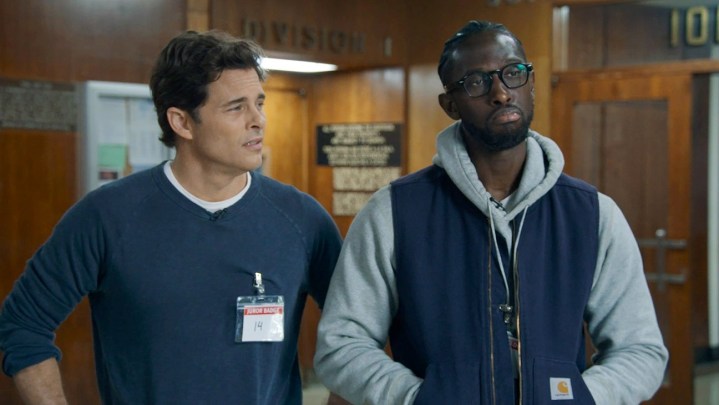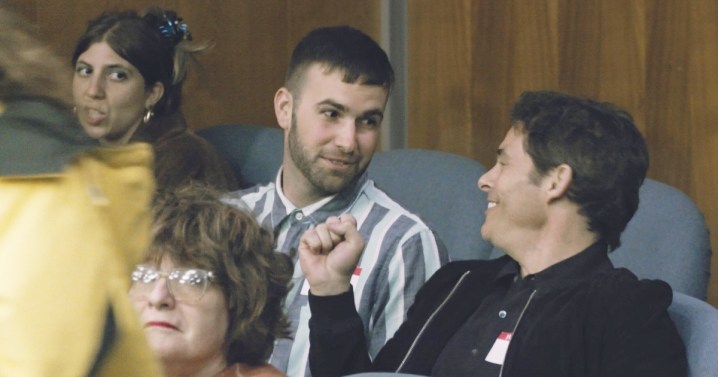It’s only May, but TV fans have already been treated to great new shows and returning series. Poker Face started things off on a high note, bringing back the Colombo-style detective shows from the 1970s and giving them a modern polish thanks to creator Rian Johnson and lead star Natasha Lyonne. The Last of Us became a pop culture phenomenon, and Netflix again scored hits with The Night Agent and The Diplomat. Comedy shows have been thriving too, from solid middlebrow hits like Unstable and That ’90s Show to excellent social satires like Beef and Lucky Hank. Heck, even broadcast comedies have been shockingly not bad, with NBC’s Night Court revival and Fox’s Animal Control good enough for lots of charm and a few chuckles.
But which one’s the best, the one you should drop everything for and watch immediately? Would you believe me if I told you the best new comedy show of the year (so far) is a unique reality show/mockumentary hybrid starring mostly no-name actors, centered around a gimmick that is essentially one long tired joke, with a generic title that evokes a bad Pauly Shore movie from the ’90s and is currently available to stream on Freevee, Amazon’s ad-supported stepsister to its more premium Prime Video? I can hardly believe it myself, but it’s true: Jury Duty, the under-the-radar comedy that premiered just a month ago, is 2023’s best new comedy. Here are a few reasons why you should watch it.
It’s got a simple, but intriguing concept

Jury Duty‘s tagline sums up the concept perfectly: “12 jurors. 11 actors.” Ronald Gladden, a 29-year-old SoCal bro and solar contractor from San Diego, is called for jury duty for a seemingly mundane civil case: a rich woman is suing one of her poor employees for damages to her T-shirt-making company. Ronald goes through all the steps one takes in the process: waiting for the call to enter the courtroom, being assessed by both the prosecution and the defense, jury selection, being sequestered, visiting an outside location to examine evidence, and, finally, deciding whether or not the defendant is liable. Camera crews are documenting the trial process for an unnamed reality TV show, so Ronald assumes everything is legit.
It isn’t. Everyone involved in the trial, from the other jurors that serve with Ronald to the lawyers arguing the case to the judge, are actors. They are all hired for one specific purpose: to deceive Ronald into actually thinking the case is real. The ruse works, and that’s what makes the show so hypnotic to watch. There is a constant tension between whether or not Ronald will figure out it’s all an elaborate setup, and it’s that tension that generates much of the show’s off-kilter humor.
The main ‘character’ is a terrible actor (and that’s a good thing)

Usually, a TV show sinks when the lead actor is wooden and not that great of an actor. The reverse is true with Jury Duty since Ronald, who usually is stone-faced throughout the trial, isn’t an actor and he doesn’t pretend to be one or play to the camera for laughs. When something unusual happens, like when a fellow juror asks him to jump up and down on his bed to help him have sex with a girl (don’t ask), he doesn’t recoil in horror or laugh out loud; instead, he politely declines, as if the request was perfectly ordinary and not at all weird and inappropriate.
Ronald’s blankness, and his refusal to show how the absurdity of the trial is affecting him, are what help sell the concept. You believe he’s just an ordinary Joe plucked from the street, not an actor “playing” a normal person, which he isn’t. It provides a good contrast to the other jurors, who each have a character trait they embody and play with throughout the series. And speaking of the jury …
The supporting cast is Office-level good

Each member of the jury, and even the lawyers and defendants involved in the case, are hilarious and evoke another workplace mockumentary that is beloved by the public: The Office. While that show was centered on Michael Scott and, to a lesser degree, Jim, Pam, and Dwight, it benefited from its deep bench of supporting characters like Stanley, Phyllis, Creed, Angela, Oscar, and the rest. Jury Duty functions the same way, supporting Ronald with a colorful cast of characters that are both believable and very, very funny. That shouldn’t be too much of a surprise, as Jury Duty‘s creators, Lee Eisenberg and Gene Stupnitsky, also worked on The Office.
There’s Todd, who’s obsessed with making his own homemade cybernetics and creates his own “seatpants” out of crutches and duct tape that have little functional use in the real world. (His scenes where he tries to sit with his invention, both in a van to the courthouse and on the jury itself, are the show’s funniest and achieve a kind of absurd perfection.) Mousy nerd Noah becomes gradually obsessed by his growing realization that his girlfriend is cheating on him, while senior citizen Barb keeps falling asleep while the trial is in process (it’s Ronald’s job to keep her awake, which provides several bits of inspired comedy).

Did I mention Officer Nikki, who’s had it up to here with Todd’s odd behavior and just wants to have a nice meal at Jimmy Buffett’s Margaritaville? Or Jeannie, who wears inappropriately revealing shirts and has a thing for corrupting nerds? (Noah, naturally, is her primary target). There’s Inez, who wants to take charge of even the most minuscule of tasks like ordering lunch, and Shaun Sanders, the inept defense attorney who keeps messing up the most basic of duties, like bringing the right case file to work. While Jury Duty‘s high concept initially brings you in, it’s the entire cast of talented character actors committing 100% to the bit that makes you stay and watch.
James Marsden shines as … James Marsden

There’s one person in the cast I haven’t mentioned yet since he deserves a special spotlight. James Marsden, the actor most famous for the X-Men and Sonic the Hedgehog movies, has his best role in years as … James Marsden. It’s a bit cliché at this point for actors to play exaggerated versions of themselves (Nicolas Cage just did it last year in The Unbearable Wight of Massive Talent), but here it works because Marsden isn’t afraid to poke fun at his B-list status. Frequently referred to as “X-Man,” Jury Duty‘s version of Marsden is desperate to prove how important he is by frequently referencing the current (fake) project he is involved in, a Yellowstone-type Western drama.
He’s also a terrible person who doesn’t want to be blamed for anything embarrassing that might tarnish his image. This reaches its apex when Marsden asks Ronald if he can use his bathroom to, er, take care of business. He ends up clogging the toilet, which necessitates a plumber to come and solve the problem. Marsden pleads with Ronald to take the blame, which he does without protest. What’s funny about this bit is how desperate James is for Ronald to take the fall, with Marsden going out of his way to indicate it was indeed Ronald who clogged the toilet and not the actor who played Cyclops and starred in the cheesy comedy Sex Drive. It’s stupid and crass, but it’s also funny, and it shows Marsden is game to disparage his own image for a well-earned laugh or two.
It’s surprisingly subtle and sweet

With a concept that relies primarily on deception and lying, Jury Duty is surprisingly good-natured and, dare I say, subtle? Yes, this is a show that uses excrement and masturbation as gags, but it never goes too overboard with its premise or in how it executes its elaborate lie. A good example of Jury Duty‘s restrained approach is when Ronald has to make sure Barb stays awake during the trial. Just before one session, she confesses she’s ingested a cookie laced with Dexedrine to stay awake.
A lesser show would’ve made Barb hallucinate and trippy as a result, but instead, Jury Duty just has her laugh occasionally as the trial progresses. The comedy here isn’t necessarily how Barb reacts to her the drugs in her system; rather, it’s how Ronald reacts to Barb, knowing she has drugs in her system. It’s subtle approach to a conventional comedic setup, and it makes the show better by not doing the obvious.
Jury Duty also showcases a sweetness behind its humor, and that’s largely due to Ronald. When confronted with Barb’s behavior, he doesn’t rat her out or disparage her; instead, he congratulates her for staying awake. Todd is initially presented as a weirdo, but Ronald takes him under his wing and encourages him to be more socially outgoing. When the judge tasks him with being the foreperson, Ronald steps up in a big way, and he manages to get the group together to form a consensus as to whether or not the defendant is liable. Since Ronald isn’t in on the joke, it’s his reactions to the pre-]fabricated bits that determine the show’s tone. Because Ronald is a stand-up guy, the show itself is a somewhat affirmative portrayal of humanity (at least, the slice of it that’s involved in the trial) and the legal system.
It’s even better when you watch it a second time (or third or fourth)

I had a blast binging Jury Duty on my initial watch, enjoying the progression of the trial, meeting new characters, and marveling at the unique ways the producers weave multiple narratives that wrap around Ronald’s non-fictional presence. Yet my main interest was wondering just how and when the elaborate ruse would be revealed. When would Ronald find out? During deliberations? At the hotel where everyone is sequestered? And how would Ronald react when he discovers he’s been lied to by everyone?
On my second re-watch of the show, I discovered that Jury Duty, like any other great comedy, holds many pleasures with repeat viewings. I noticed just how well all of the actors work together to create a believe pool of strangers thrust together by their civic duty. At times, I caught an actor almost breaking character because another actor was being too funny with their improv skills. (This is most apparent when everyone is asked to give their impression of Tim, the injured juror who leaves in episode 2.) Most importantly, I marveled how just how well-constructed and directed this show is. Jury Duty is a delicate balancing act, one that involves weaving an engaging fictional narrative while also making sure its central subject remains oblivious to that narrative, and it’s great to watch just how smoothly everything comes together episode by episode.
It’s free!
You usually have to pay for quality entertainment, especially in this age of streaming, but Jury Duty is the rare great comedy that’s also free. All eight episodes of its inaugural season are currently streaming on Amazon’s Freevee service, and the only cost is the occasional 90-second ad here and there.
It’s not the first Freevee Original show, but it’s certainly the only one I binge-watched in a day– and it seems I’m not alone. The show holds an astounding 98% audience rating on Rotten Tomatoes. While I usually don’t hold those kinds of metrics as indicators of quality, in Jury Duty‘s case, it is. It’s the rare modern comedy series that critics passed over and is now being reclaimed by an appreciative audience. I fell under its spell one afternoon in late April, and I don’t regret it. Chances are, you won’t either.
Season 1 of Jury Duty is now streaming on Freevee. Want to know more about the show? Then read 8 interesting facts about Jury Duty.
Editors' Recommendations
- Fallout’s breakout star is Walton Goggins. Here are 3 movies and shows you need to watch now
- This massively popular 2023 movie pissed me off. Here’s why you shouldn’t watch it
- House of Ninjas is Netflix’s newest hit action show. Here’s why you should watch it
- Resident Alien is now a big hit on Netflix. Here’s why you should watch this underrated sci-fi show
- This excellent 2023 movie received no Oscar nominations. Here’s why you should watch it anyway




